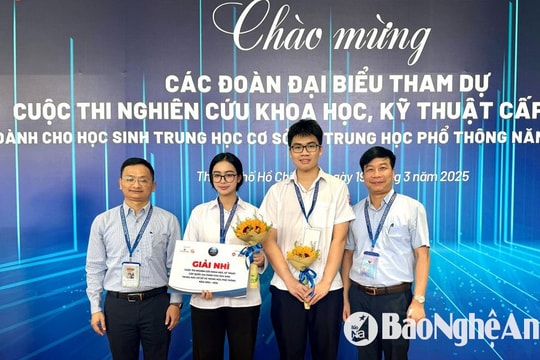President Ton Duc Thang and the Party's revolutionary propaganda work
(Baonghean.vn) - About comrade Ton Duc Thang, President Ho Chi Minh once wrote: "Comrade Ton Duc Thang is a very excellent son of the Fatherland", "a model of revolutionary morality: a lifelong frugality, integrity and honesty; a lifetime of wholehearted devotion to serving the revolution and serving the people".
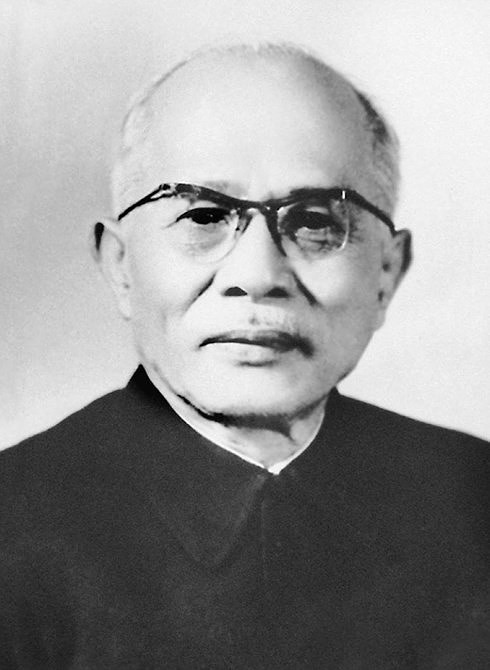 |
| President Ton Duc Thang - exemplary leader, staunch communist (Photo archive) |
I. Comrade Ton Duc Thang (1888 - 1980) was a key leader of the Party and State; a close comrade in arms, a capable collaborator and successor of President Ho Chi Minh's revolutionary career; an outstanding son of his hometown An Giang. At 92 years old, with 50 years of Party membership, more than 70 years of revolutionary activities, and nearly 17 years of imprisonment by the imperialists, Comrade Ton Duc Thang made many important contributions to the revolutionary cause of our Party and nation and made certain contributions to the world revolution.
Prime Minister Pham Van Dong commented: “The most precious legacy that comrade Ton Duc Thang left to the people is the personality of Ton Duc Thang”. Comrade Ton Duc Thang’s contributions are shown in many aspects, from activities in the workers’ movement in Saigon in the early 20th century; participating in the uprising of French sailors in the Black Sea, protecting the Russian October Revolution; establishing trade unions, gathering, propagating, educating, leading the workers’ movement; activities and contributions in the Vietnam Revolutionary Youth Association; propagating and fighting for revolution in imperialist prisons; together with the Party and State leading the resistance war for national construction in the period 1945-1954…
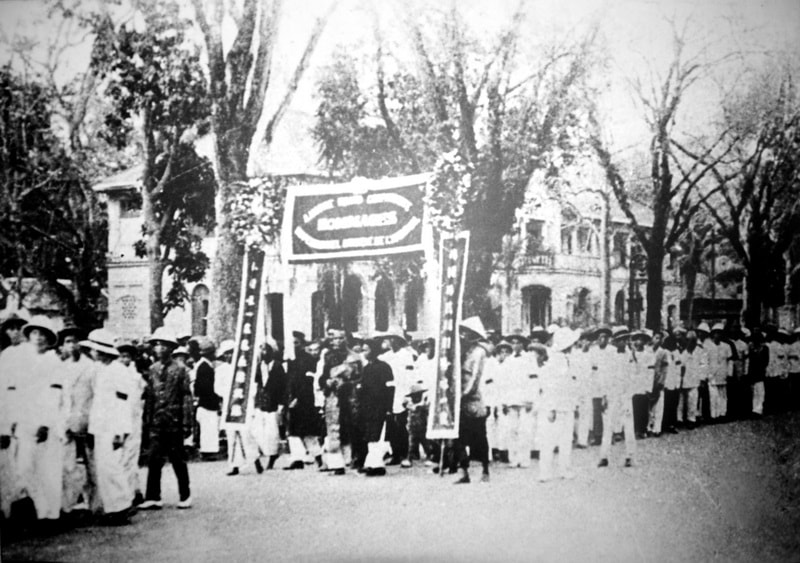 |
| Workers of Ba Son factory and printing factory attend the funeral of Phan Chu Trinh, April 4, 1926. Photo archive |
One of the outstanding contributions of comrade Ton Duc Thang that had great significance to the Vietnamese revolutionary cause from the early days of the Party's establishment throughout the two resistance wars against colonialism and imperialism and the early years of the period when the whole country was unified and moving towards building socialism was the propaganda and agitation work that created unity in perception and action within the Party and all classes of people. That contribution was not only significant during the period when Ton Duc Thang was active and led the revolution, but also significant for the Party's propaganda work in the current period.
IIRegarding the propaganda and agitation work of comrade Ton Duc Thang for the revolutionary cause of the Party and the nation, we can emphasize some main issues as follows:
One is, he propagandized and soon aroused in the masses of workers and laborers the spirit of patriotism, resistance against foreign invaders, boldly fighting for class rights leading to the establishment of trade union organizations.
From the age of 12, Ton Duc Thang often went to his teacher to ask and listen to stories about patriots such as Nguyen Trung Truc and Nguyen Dinh Chieu. When he heard that Phan Boi Chau was about to go to the South, he found a way to meet him and learn more about the times and Phan's national salvation policy.
In 1906, after finishing primary school in his hometown, Ton Duc Thang went to Saigon to find a new life and also to seek a way to avenge the humiliation of the people who lost their country. After more than a year of studying the reality of the bustling city, Ton Duc Thang assessed that Saigon had four types of people: 1) Saigon of the French rulers. 2) Saigon of the civil servants and bosses. 3) Commercial Saigon with grocery stores, restaurants, hostels, wine shops, and theaters. 4) Saigon of the workers. Finally, he chose to learn a trade as a craftsman, gradually infiltrating the Vietnamese working class that was on the way to forming a class.
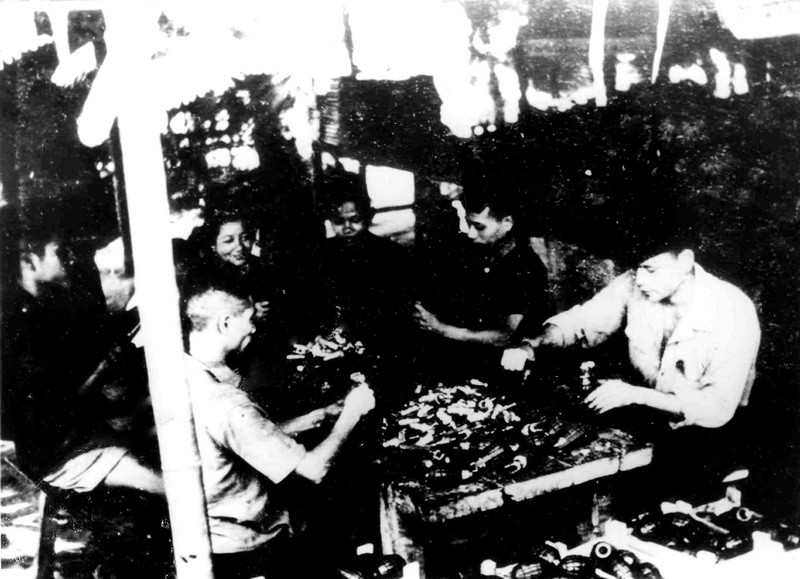 |
| Ba Son workers participate in weapons production at the engineering workshop. Photo: Archive |
Realizing the strength of the workers and witnessing the exploitation of the landlords, Ton Duc Thang sought to gather, call upon, and mobilize workers to promote patriotism, stand up against the landlords, and demand higher wages (in 1910); participated in leading the Ba Son workers' strike and mobilized students from the Saigon University of Arts to strike (in 1912). In 1913, Ton Duc Thang went to France to work as a worker in Toulon; in 1914, he was recruited as a soldier for a French Navy unit; in 1919, he participated in the anti-war movement against the imperialist intervention in Soviet Russia in the Black Sea.
In 1920, after returning to Saigon from France, realizing the need for workers' organization, he propagated, enlightened, gathered, educated workers, and established the Trade Union - the predecessor of the Trade Union. Thanks to Ton Duc Thang's organization and focus on propaganda, the great strike of Ba Son workers (August 1925) caused a great resonance, marking the maturity of the Vietnamese workers' movement. From here, "the Vietnamese working class began to enter into organized struggle with clear political goals".
Two is, made great contributions to spreading Marxism-Leninism in Vietnam; actively responded, called on, and introduced young people to join the Vietnam Revolutionary Association, propagated and mobilized workers, laborers, and intellectuals to wholeheartedly follow the revolution under the flag of Nguyen Ai Quoc.
Through a number of documents updated from practical activities during his time in France (1913-1920) and Nguyen Ai Quoc's documents from Guangzhou (China) transferred to Saigon port, comrade Ton Duc Thang propagated and popularized Marxism-Leninism, making it quickly penetrate into the real conditions in Vietnam, especially among the working class and laborers in Saigon. He was one of the first people to propagate and apply Marxism-Leninism and the experience of international workers to build the Vietnamese workers' movement in the 1920s. Immediately after the organization of the Trade Union, Ton Duc Thang sought to closely contact with workers and sailors to receive progressive newspapers such as:Humanitarian Newspaper, People in Need Newspaper, Vietnam Souland many other articles by Nguyen Ai Quoc; organized for workers to read newspapers and communicated to many people the situation of the world's workers' struggle so that they would have more motivation to make revolution.
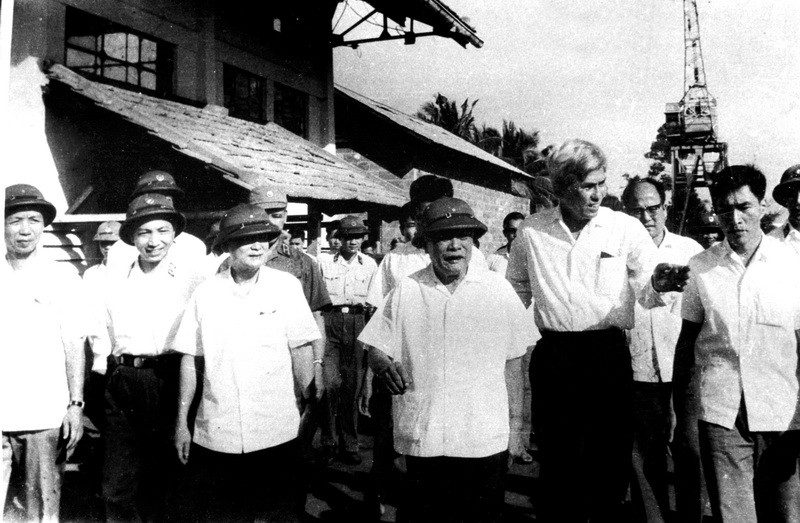 |
| President Ton Duc Thang visited workers at Ba Son Factory after the country's reunification, November 1975. Photo courtesy |
Around mid-1927, the Southern Region of the VNCMTN was established in Saigon. Ton Duc Thang actively propagated and mobilized many young people to become enlightened and join the Association; at the same time, he selected and introduced outstanding workers of the Ba Son factory such as Nguyen Van Tu, Ngo Van Nam... to Guangzhou to attend Nguyen Ai Quoc's political training classes. In the "proletarianization" movement, he played a major role, contributing to the application of Marxism-Leninism to the workers' movement, creating a premise for the establishment of the Communist Party later.
Three isDuring his time in Con Dao prison, he actively propagated, founded organizations, published newspapers, created ideological unity, instilled faith in the revolutionary cause, strengthened fighting spirit, and educated and raised awareness among prisoners.
During the years of imprisonment by the French colonialists in Con Dao (1930-1945), Ton Duc Thang founded and was the President of the Association.Red Prisoners AssociationHe was the core leader, gathered prisoners, created solidarity against the prison regime, actively propagated revolutionary lines and Marxism-Leninism to prisoners. He was also one of the founders of the first party cell in Con Dao prison with the following purposes: leading the struggle in prison; educating and fostering theory among each other; propagating and enlightening soldiers and wardens; contacting the Party in the mainland and organizing prison escapes.[2]In addition, he is also an organizer.Prisoner Relief AssociationThe purpose is both to take care of prisoners and the main purpose is to propagate and educate culture and patriotism; to establish and chair the Prisoners' Association.
In Con Dao prison, thanks to the leading role of comrade Ton Duc Thang,General opinion reportFounded in 1932, the magazineGo aheadwas born in early 1935, as an important means of revolutionary propaganda, guiding prisoners in Con Dao to persevere in the struggle according to communist ideals. In addition, he also sought the support of a number of French soldiers and civil servants in Con Dao who were sympathetic to the Vietnamese revolution, asking them to buy books and progressive newspapers published in France to serve revolutionary propaganda.
When learning that Nazi Germany had attacked the Soviet Union, a fierce ideological struggle took place within the Party in Con Dao prison about the role of the Soviet Union in World War II. With his sharp knowledge and strong belief, Ton Duc Thang explained and inspired everyone. When Japan staged a coup against France in Indochina (March 9, 1945), there was division within Con Dao prison. Ton Duc Thang pointed out the inevitable failure of fascism, affirmed the inevitable victory of the Vietnamese revolution and the allied countries, and predicted the birth of a series of socialist countries under the role of the Soviet Union.
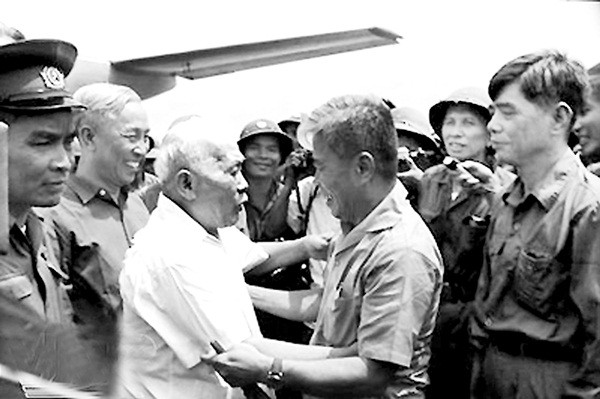 |
| President Ton Duc Thang arrived in Saigon to attend the celebration of the nation's great victory on the morning of May 13, 1975. Photo courtesy |
Four isTon Duc Thang was both a leader and an organizer, propagandist, calling for national unity, creating a combined strength, contributing to helping the Vietnamese revolution overcome difficulties and challenges, winning victories in two resistance wars against French colonialists and American imperialists, and unifying the country.
The August Revolution of 1945 succeeded, the Democratic Republic of Vietnam was born, opening a new era. But the young revolutionary government had to deal with countless difficulties and challenges. Internally, "famine", "ignorance", and "internal traitors" were rampant; externally, imperialist, hostile, and reactionary forces colluded with lackeys and internal traitors, seeking to surround and sabotage, in order to overthrow the revolutionary government and re-establish their rule. Following in the footsteps of Chiang's army were the lackeys.VietnameseLed by Nguyen Hai Than, they entered through Cao Bang, Lang Son, and Mong Cai, actively harassing and distributing leaflets everywhere against the Viet Minh, creating accusations against the Ho Chi Minh Government.Viet Quocled by Vu Hong Khanh and Nguyen Tuong Tam also rushed back to the country via Lao Cai and Ha Giang. Pro-Japanese political organizations such asDai Viet Revolutionary Party,Dai Viet Duy Tan Party, Vietnam Restoration Party, Vietnam National Socialist Party, Patriotic Youth Union...active
In such a context, the creation of a great national unity bloc with the same aspirations to serve the resistance war and build the nation was extremely important. On May 29, 1946, the Vietnam National United Front was established with Mr. Huynh Thuc Khang as President and Comrade Ton Duc Thang as Vice President. Together with the Party and State leaders, Ton Duc Thang promoted the spirit of national unity, calling for the strength of unity within the Party and the people under the revolutionary flag of Ho Chi Minh. He called: If anyone has prejudices of class, of party, of religion, then coming to this meeting room has also listened to a call that is more noble and sacred than many ordinary calls: the call of the Fatherland. That atmosphere completely reflected the general situation of the country - the state of unity of will and action.
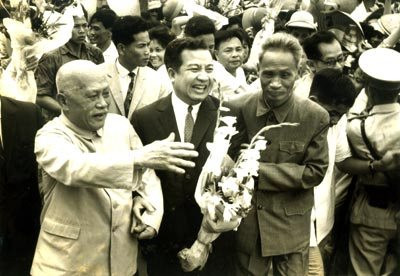 |
| President Ton Duc Thang and Prime Minister Pham Van Dong |
When Mr. Huynh passed away, Ton Duc Thang became the President of the Lien Viet Association and Acting Minister of the Interior, with even more responsibility. Since 1948, he was assigned the task of starting the process of unifying the Lien Viet Association with the Viet Minh Front. Since 1955, he has been the President of the Vietnam Fatherland Front. For more than 30 years as the head of the front, he has been continuously trusted by the Party, the State, and Uncle Ho to take on important responsibilities, wholeheartedly raising the flag of gathering the strength of great national unity. In particular, he was both the head of the organization and an active propagandist calling on all classes of people to build a great national unity bloc, contributing to the victory of the resistance wars against colonialism and imperialism. Therefore, comrade Truong Chinh affirmed: comrade Ton Duc Thang was the most representative person of the solidarity policy of the Party and of President Ho Chi Minh.
Five isComrade Ton Duc Thang was the first person to directly organize, propagate and carry out patriotic emulation movements according to the teachings ofThe callof President Ho Chi Minh.
The spirit of patriotism and active patriotic emulation has truly become a revolutionary action movement of the entire people, organized and directed uniformly from the Central to the grassroots level under the leadership of our Party and State since 1948, associated with President Ho Chi Minh's promulgation of the Law on National Action.Call for patriotic emulationnMay 1, 1948 (only 104 words) andCall for patriotic emulationJune 11, 1948; The Party Central Committee issued a Directive on March 27, 1948, launching the patriotic emulation movement. In which, comrade Ton Duc Thang played a great role in putting policies into practice, turning them into revolutionary actions, bringing about practical results. It was comrade Ton Duc Thang who contributed to the rise of the movement.Tet tree planting, every house plants trees, every person plants treesinitiated by Uncle Ho
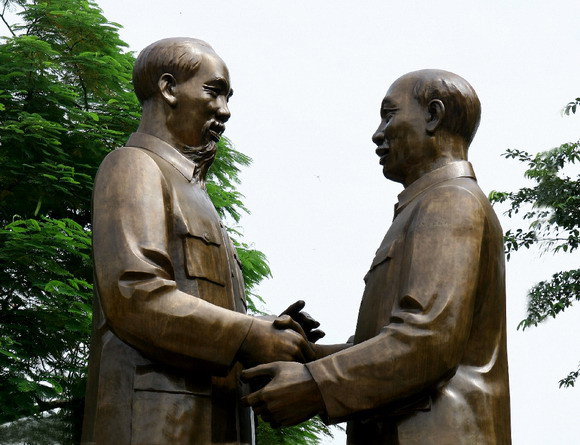 |
| Statue of Uncle Ho and Uncle Ton at Thong Nhat Park, Hanoi. Photo from the internet |
With the responsibility of being the Head of the Central Committee for Patriotic Emulation Movement, Comrade Ton Duc Thang had the merit of building plans, mapping out routes, organizing, propagating, and calling on all classes of people to implement Uncle Ho's call. Thanks to that, during the period of fighting against the French, there were many emulation movements in various forms with practical action slogans to realize the common goal of the resistance war: the whole people, comprehensive, long-term, self-reliant. The movements, "soldiers at the front compete to kill the enemy and gain achievements, compatriots in the rear compete to increase production", "fields are battlefields, hoes are weapons, farmers are soldiers, the rear competes with the front", "everyone competes, every industry competes, every day competes, we will definitely win, the enemy will definitely lose"... attracted compatriots and soldiers across the country to actively contribute in all aspects to the resistance war, contributing to the resounding Dien Bien Phu victory in 1954 that shook the world.
Continuing that spirit, during the resistance war against the US to save the country, many patriotic emulation movements emerged and flourished in all professions, sectors, and fields. These were typical movements such as: The "Three Best" movement in the army appeared from June 18, 1960; the "Great Wind" movement in agriculture and the "Emulation with Dong Hieu" movement in state-owned farms appeared in early 1961; the "Sea Waves" movement in industry and "Emulation with Thanh Cong Cooperatives" in handicrafts appeared in mid-1961; the "Two Goods" emulation movement in the education sector appeared from September 1961; the "Three Ready" and "Five Volunteers" movements appeared in late 1964 and early 1965; the "Three Responsible" movement appeared in March 1965... In some localities, many movements also appeared with slogans such as: "Stick to the land to protect the village"; “Not an inch gone, not a millimeter moved”, “Kill the enemy and make achievements”, “Brave warriors destroy the Americans”, “Find the Americans to fight, find the puppets to destroy”, “Cling to the enemy’s belt to fight”, “Stretch the enemy and fight, surround them and destroy them”… These emulation movements contributed greatly to the great victory, liberating the South and unifying the country.
In his speech at the Party's National Conference in Viet Bac (January 21 to February 3, 1950) "Promoting emulation, aiming in the right direction", he raised many issues that not only summarized experiences but also served as a propaganda slogan, calling on everyone to enthusiastically compete to achieve many achievements and make effective contributions to the country.
Six is,Comrade Ton Duc Thang was the one who early propagated and called for studying and following Ho Chi Minh's ideology, morality and style.
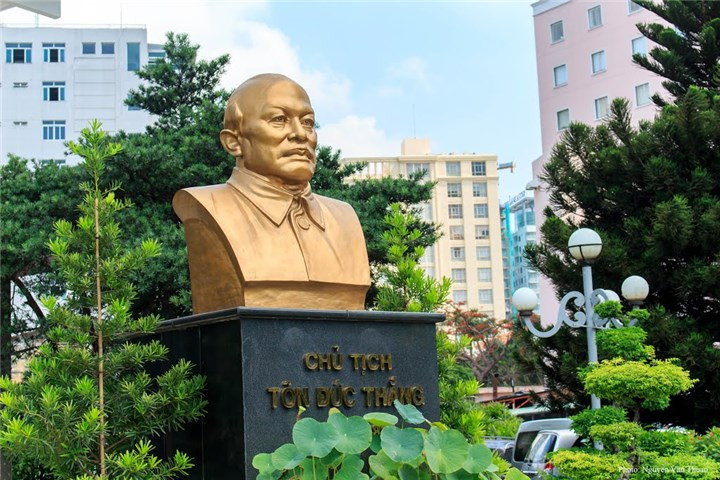 |
| Statue of President Ton Duc Thang in An Giang province. Photo source: Internet |
Comrade Ton Duc Thang had more than 20 years (1946-1969) to live, work and collaborate with Ho Chi Minh, and was trusted with many important responsibilities in the Party, the State and socio-political organizations (Vice President from June 1960 to September 1969, acting President from September 3 to September 22, 1969, President from September 22, 1969 to March 1980). More than anyone, he understood the value of Ho Chi Minh's ideology, ethics and style, and realized that "the Party's political line, working discipline and revolutionary ethics are Ho Chi Minh's line, style and ethics". Therefore, from the 2nd Party Congress in February 1951, he called on, propagated and encouraged the entire Party to strive to study Ho Chi Minh's political line, style and revolutionary ethics; affirming that this is the prerequisite for the Party to be strong and the revolution to quickly achieve victory. However, it was not until 1969, after his death, that the Politburo (term III) issued Directive No. 173-CT/TW dated September 29, 1969, opening a political activity campaign in the entire Party, the entire people, and the entire army on "Studying and following President Ho Chi Minh's Testament" with the aim of increasing pride, excitement, confidence, and determination to implement his teachings, bringing the cause of resistance against the US and national salvation to complete victory. On August 19, 1989, the Politburo of the term VI issued Notice No. 151-TB/TW on a number of issues related to the Testament and the date of President Ho Chi Minh's death. In particular, since the 7th Party Congress (June 1991), the work of studying and researching Ho Chi Minh's ideology has been further promoted.
At the beginning of the 21st century, to successfully carry out the new requirements and tasks of the Vietnamese revolution, the Secretariat issued Directive No. 23-CT/TW dated March 27, 2003 on "Promoting research, propaganda, and education of Ho Chi Minh's ideology in the new period". Three years later, the 10th Politburo issued Directive No. 06-CT/TW dated November 7, 2006 on organizing the campaign "Studying and following the moral example of Ho Chi Minh". Five years later, the Politburo (11th tenure) issued Directive No. 03-CT/TW dated May 14, 2011 on continuing to promote studying and following the moral example of Ho Chi Minh. On May 15, 2016, the 12th Politburo issued Directive No. 05-CT/TW on "Promoting studying and following Ho Chi Minh's ideology, morality and lifestyle", bringing the study and following of Uncle Ho to a new level in many aspects, demonstrating the high determination of our entire Party, people and army.
Seven isComrade Ton Duc Thang contributed to foreign propaganda, creating international solidarity and unity, and achieving the goal of protecting world peace.
Comrade Ton Duc Thang was an active soldier and propagandist in the struggle to protect world peace. His first foreign activity of great propaganda significance was the event on April 20, 1919, when he participated in the uprising of sailors on a French warship to fight against the counter-revolutionary war of the imperialists who wanted to destroy Soviet Russia, protesting against the war and protecting peace. After this event, he was expelled from France, returned to Saigon to continue working as a worker, actively propagandizing and calling for opposition to the imperialist war, protecting peace and national liberation.
After 1945, during the resistance war against the second French colonial invasion, he had many important activities contributing to tightening the revolutionary relations among China, the Soviet Union, Laos, and Cambodia. Especially the propaganda work, implementing the solidarity in fighting of the three Indochinese countries. During the resistance war against the US to save the country, with many articles, sharp statements at forums and some practical instructions, he contributed to defeating false peace arguments, smashing the plot to divide Vietnam from its allies and international friends. Therefore, he was the first Vietnamese to receiveStalin Prizefor the cause of strengthening peace and friendship among nations (later named the Lenin International Peace Prize) awarded by the Soviet Union.
When participating in the Vietnamese delegation to work in France in 1946, comrade Ton Duc Thang and other comrades contacted, propagandized, mobilized, and influenced many members of the French National Assembly and representatives of mass organizations. That made many classes of French people understand more about the just struggle of the Vietnamese people, from which they supported the just resistance of the Vietnamese people, tightening the relationship between the people of the two countries. In the following period, he had many active activities in foreign propaganda, contributing to bringing the image and people of Vietnam to the world, creating a close, friendly relationship between Vietnam and the world, the world and Vietnam.
IIIIn current propaganda work, we can learn from comrade Ton Duc Thang some important issues:
One is, learn the ability to take the lead of a propaganda officer, both doing ideological work and taking care of organizing and implementing revolutionary movements to achieve the set goals.
Two is, closely following Ho Chi Minh's propaganda motto, practicing the ability to persuade people, using one's own capacity, qualities, and prestige as a living example to motivate, influence, and convince others. Do not use orders or imposition in propaganda, resolve relationships between people, but use understanding and mutual sharing, creating values that gather people's hearts, with profound humanistic influence. Respect oral propaganda, enhance the agitation in propaganda language, stick to reality, do not impose, target the right audience, avoid formality.
Three isTo do propaganda, one must have deep political belief, which is formed on a scientific basis. To do so, one must focus on studying theory, imbuing Marxism-Leninism and Ho Chi Minh's thought, and applying them fluently to revolutionary practice.
Fourth,Strengthen foreign propaganda activities to promote the image of the country and people of Vietnam to international friends. We must respect and promote the role of overseas Vietnamese, not only as an important force in foreign propaganda that acts as a bridge to connect the image of the country and people of Vietnam with international friends, but also as a force that directly refutes the distorted, destructive arguments that hinder Vietnam's development path. As comrade Ton Duc Thang advised: Overseas Vietnamese must also actively operate, find ways to propagate our just war, gain sympathy with peace-loving people in the world, and defeat the arguments of international reactionaries.
Five is,Actively propagate the struggle and refute wrong views to protect the Party, the State, the regime, and the peaceful life of the people. This is extremely important in the current context, many reactionary and hostile forces are using many tricks to distort national history, speak ill of the Party and the regime, defame the reputation of some Party and State leaders, and incite and incite people to protest and riot.
The 130th anniversary of Comrade Ton Duc Thang's birth is an opportunity for us to once again review and evaluate more fully and deeply his activities and contributions to the revolutionary cause of Vietnam and the world; thereby, further honoring and appreciating his talent and personality, and learning from his shining example.

